Page 16 • (383 results in 0.023 seconds)
-
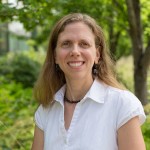
Dean of Natural Sciences | Natural Sciences | aumanaj@plu.edu | 253-535-8485 | Dr.
communities of methane-oxidizing bacteria in Lake Washington sediment, focusing on techniques allowing for estimating population sizes of different subgroups of these bacteria. Since her arrival at PLU in the Fall of 2002, Dr. Auman has primarily taught introductory biology and microbiology courses. As a microbial ecologist, Dr. Auman’s professional interests focus on studying microbial communities in natural environments with the goal of understanding how the microbes contribute to global processes and
Office HoursMon - Fri: -Area of Emphasis/Expertise -
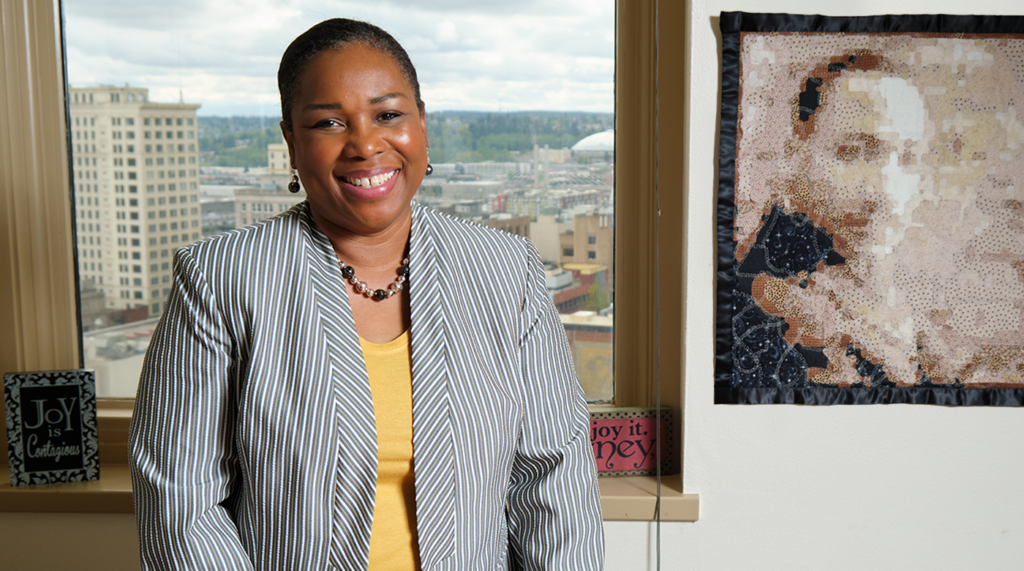
As far back as middle school, others noticed Lisa Woods’ quiet strength and power of observation. “My demeanor is to listen, hear people and see people,“ she says. “I’ve developed that over time, but I’ve always been the listener in the room and not necessarily…
inequities. “We are understanding more just how connected our processes are in creating disparities,” she says. “We’ve been educating our workforce on what equity is, how to look at things through an equity lens, and dissecting how we do what we do. We’re typically one piece of the system, but often, the piece that we can change can still make a difference.” She’s enthusiastic about encouraging community member participation in Tacoma commissions, explaining commission work and reasons to volunteer. “I
-

The City of Tacoma provides high-quality, innovative and cost-effective municipal services that enhance the lives of its 215,000 residents and the quality of its neighborhoods and business districts. PLU alumni Tom Chontofalsky ’03, Clarissa Gines ’12 and Lisa Woods ’92 are three of the many…
the first voter-approved Cultural Access Program in Washington State. The initiative intends to increase access to Tacoma arts, culture, heritage, and science experiences by reducing barriers to access and expanding offerings, particularly for underserved youth. As the program coordinator, Gines helps update funding guidelines, builds out application processes, communicates with organizations, and helps distribute funding. Read our full profile of Clarissa Gines. The Powerful ObserverAs far back
-
Pacific Lutheran University School of Nursing embraces core values of: Compassion and kindness Competence Diversity, equity, and inclusion Excellence Respect and integrity Service Social Justice
, interdependence, and social justice. As a practice discipline, Nursing works to improve the health and well-being of clients and systems through analytical processes that effect change in the conditions and determinants of health. The work and praxis of nursing are manifest through multiple complex and evolving roles. Nursing strives to respond to the contemporary context of health and illness, and advance shared goals of compassionate, safe, and effective care. Health encompasses the unique and dynamic
-
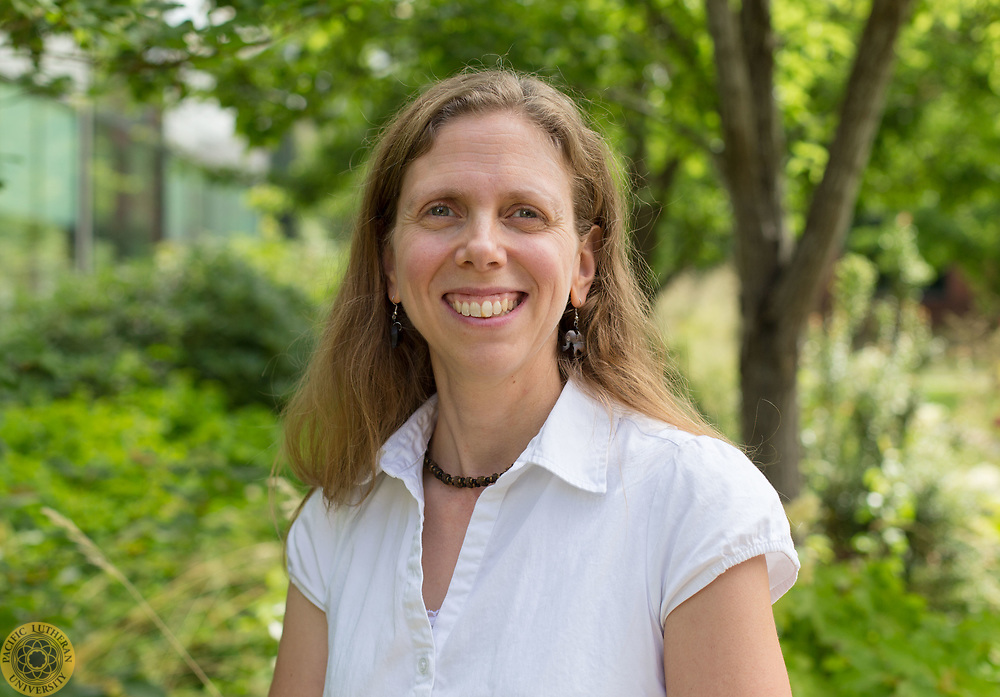
Dean of Natural Sciences | Pre-Health Sciences Advising | aumanaj@plu.edu | 253-535-8485 | Dr.
communities of methane-oxidizing bacteria in Lake Washington sediment, focusing on techniques allowing for estimating population sizes of different subgroups of these bacteria. Since her arrival at PLU in the Fall of 2002, Dr. Auman has primarily taught introductory biology and microbiology courses. As a microbial ecologist, Dr. Auman’s professional interests focus on studying microbial communities in natural environments with the goal of understanding how the microbes contribute to global processes and
Office HoursMon - Fri: -Area of Emphasis/Expertise -
Students are encouraged to do research with a faculty member during their undergraduate experience at PLU.
Faculty Research InterestsStudents are encouraged to do research with a faculty member during their undergraduate experience at PLU. Check the Natural Sciences website for more information about the Undergraduate Research summer program.Ann Auman I am a microbial ecologist interested in studying microbial communities in natural environments with the goals of understanding how the microbes are contributing to global processes and what products these microbes may be making that may be of
-
Major in Psychology 42 semester hours, including: PSYC 101, 242, 499 One of PSYC 310, 315, 320, or 330 Two of PSYC 440, 442, 448, or 481 At least 2 semester hours from PSYC 495, 496, or 497 12
Psychology Research Conference held every term. Psychology (PSYC) - Undergraduate Courses PSYC 101 : Introduction to Psychology - ES An introduction to the scientific study of behavior and mental processes. Topics include learning, memory, perception, thinking, development, emotion, personality, mental illness, and social behavior. (4) PSYC 148 : Minds, Brains, and Computer: Introduction to Cognitive Science An introduction to the interdisciplinary study of the mind. Students will explore how the mind
-
World expert addresses masculinity, violence Silence is not golden. That was the message from Sut Jhally , founder and executive director of the Media Education Foundation . Jhally’s address last Thursday marked the beginning of PLU’s first Men Against Violence Program conference that examined men’s…
silence of the rest of us, the silence of the rest of us who consider ourselves the good guys.” A communication professor at the University of Massachusetts, Jhally is one of the world’s leading scholars on the role advertising and popular culture play in the processes of social control and identity construction. At his talk, he said gender identity does not occur naturally; instead it’s learned from images in the media, from peers and family members, and people simply act out the culturally-accepted
-
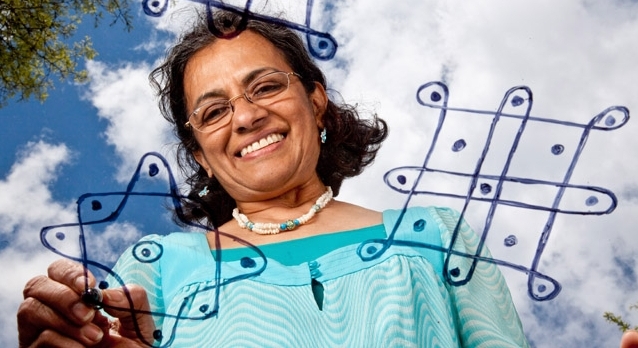
PLU Associate Professor Vidya Thirumurthy draws a kolam, an artful design that Hindu households use to communicate with their community. (Photo by John Froschauer) Connecting the dots: Letting neighbors know “all is well” with the world By Steve Hansen, Scene Editor Each morning, on the…
later taught in the classroom? “Children come [to school] with a whole lot of socio-cultural processes when it comes to learning,” Thirumurthy said. “So we need to find out how teachers can connect new knowledge to their cultural practices and how it informs curriculum.” Beginning in October 2011, Thirumurthy used her Fulbright grant to find out. Over seven months, she met with students and families in the Muslim and Hindu communities in Chennai, as well as observe the rituals and cultural practices
-
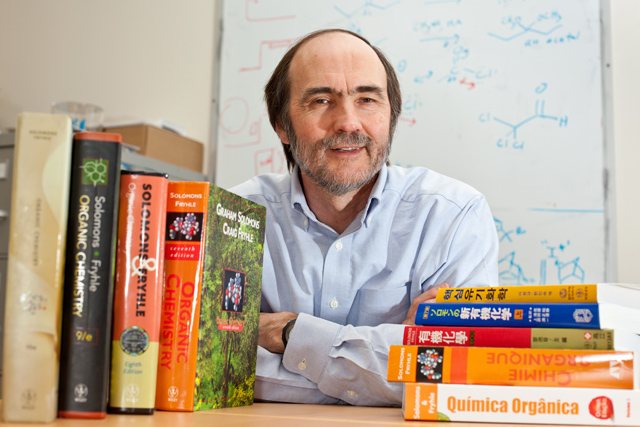
For more than a decade, Professor Craig Fryhle, chair of PLU’s Chemistry Department, has coauthored an organic chemistry textbook that has become standard, celebrated and familiar fare for sophomore students studying organic chemistry in many universities. Fryhle is just finishing up the 11th edition of…
always fun to hear from folks who seethe book in a bookstore or to meet professors at conferences who use it in with their classes, said Fryhle. He recalls hearing from a relative in Sweden who saw it there. Thousands of copies are in print. “I get a lot of satisfaction of presenting the material as cleanly and clearly as possible,” Fryhle said. “Another stimulating aspect about writing is the dialog with other organic chemists around the country about chemical processes and how we teach our beloved
Do you have any feedback for us? If so, feel free to use our Feedback Form.


